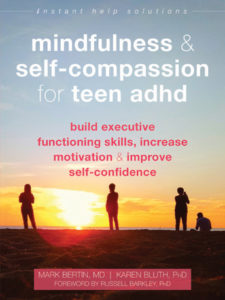Quiet Your Inner Critic
Mindfulness and Self-Compassion for Teens with ADHD
I’m going to share one of the best pieces of advice I ever got. My junior year English teacher endlessly heard me complain about school and how useless I felt it was. Without even knowing about my ADHD, she said, “You are the kind of person who hates to be bored. You don’t have to buy into high school, but you need to get through it. Make sure you go to college so at least you’ll have options for a job. How much would you hate being stuck in a job you don’t want because you let doors get slammed on you?” —Jessie, age 21
 This article is about you shifting into gear and getting your car on the road. You want to run your life, and make your own choices? Show the world what you’re capable of, and set up your future by getting a handle on school.
This article is about you shifting into gear and getting your car on the road. You want to run your life, and make your own choices? Show the world what you’re capable of, and set up your future by getting a handle on school.
Consider this: We tell ourselves stories about ourselves all the time. I’ll be happy once I’m on my own. I’m terrible at sports and I always will be. I suck at math. I’ll never remember to use a calendar. I’m not the sort of person who makes lists.
We define ourselves through such stories, figuring out what we value and who we think we are. These stories aren’t by nature right or wrong, or even true or false, but they take on a life of their own. We start to believe them. As a result, they box us in, limiting our possibilities.
Often, however, there is a kernel of truth to these stories. Like telling yourself that you don’t like to read (which could be true) when what you really dislike are long nonfiction books (which may be more specifically true). So how do your stories, especially ones affected by ADHD, limit you?
For example, is I’m not the sort of person who makes lists true of you? What is true is that remembering a to-do list may be harder for you than for most people. It may take more of your energy and discipline, and you feel lame because of that. It doesn’t mean lists won’t ever be useful. Living with ADHD may lead you to believe an overly general story about yourself.
Rewrite these stories, though, and guess what? Life gets easier. I’m not YET the kind of person who uses a to-do list. I find them annoying. I do realize that if it were easier to keep track of things, I’d feel less stressed. Your ADHD management system needs a bit of a reminder—that’s the real story.
The bottom line is this: when we drop the stories we tell ourselves, we open ourselves up to new possibilities.
The Fakest Storyteller of All: Our Inner Critic
When you have ADHD, you inevitably get corrected a lot by adults. Over time, this can make you feel bad about yourself, like you can’t do anything right. You might hear the voice inside your head screaming, “There’s no way you can finish this assignment in time. Don’t even bother starting.” Or “Read the book by the end of the week? Who are you kidding? No way!” When you believe that voice, it undermines your confidence around school.

From Mindfulness & Self-Compassion for Teen ADHD, chapter 8, “Succeeding at School with Less Stress.” Reprinted With Permission: New Harbinger Publications, Inc. Copyright © 2021 Mark Bertin and Karen Bluth
But if you pause and consider it, your inner critic rarely tells the truth. Those things your inner critic says are only a habitual way of thinking. As you no doubt know by this point, when we view our own mental habits mindfully, we recognize what’s true. Our inner critic is part of us, but not one we need to engage with quite so much.
In the moments your critic yells loudest, remember your self-compassion skills. Gently let your critic know it’s not being helpful. You might even give it a name, if that helps. “Thanks for your input, Snickerdoodle, but I’m doing everything I can right now.” Over time, you will be able to observe that voice of self-criticism without believing it quite so much.
One key to succeeding at school is changing any self-limiting stories you tell yourself about what or who you are. You are not “bad” at schoolwork, or “bad” at math or English or whatever subjects feel hard for you. You’re a person, like any other, who’s good at some things and not so good at others.
Many things your mind tells you that you are turn out to be not so permanent after all. It often creates pictures of things you “should” do that aren’t really helpful. For example, it may take less effort to keep track of your life in your head, so you think it must be best. Of course, it certainly isn’t all that effective a way to keep track of schoolwork.
Learn to be aware of your mind’s self-limiting, self-protective patterns. Then create a system for working with what you actually are—a person who happens to have ADHD—in order to achieve what you know you can: success at school.
To get your inner critic to chill, let’s learn how you can call a lifeline. In this case, you’ll find a compassionate and loving friend surprisingly close by.
FORMAL PRACTICE: Compassionate Friend
For this practice, you’ll need some imagination—it’s a bit like going on a fantasy voyage. You’ll find an audio recording at https://www.newharbinger.com/46394. Are you ready?
Either seated or lying down, close your eyes and take a few deep breaths. Allow yourself to relax and let the chair or ground support you. With each breath, see if you can let go and relax a little more.
Now, imagine a place you feel safe, comfortable, and relaxed. It can be a real place or an imagined place, but somewhere that allows you to breathe comfortably and let go of worry. Perhaps it is real, in nature, like a beach, a place in the woods near a brook, a corner of your bedroom, or the comfort of a good friend’s house. It might even be an imaginary place, like floating on a cloud.
Imagine this place in as much detail as you can. Enjoy the sounds, smells, physical sensations, and, most of all, what you feel like in this place.
Soon you’ll receive a visitor… a warm and kind friend. This is someone who loves you completely and accepts you exactly for who you are.
Maybe this visitor is a real person, like a friend, a grandparent, or a favorite teacher. Or someone from a book you’ve read, a pet, a superhero, or even a character from a comic book or movie. Or you can create someone in your mind. Imagine this being in detail, especially how it feels to be with them.
Soon you will greet your friend. You have a choice—you can either go out from your safe place to meet them or invite them in. Either is fine; do whichever feels most comfortable. Imagine doing that now.
Now imagine yourself sitting with the person at exactly the right distance away, whatever feels right for you. You feel completely comfortable and safe, completely accepted and loved. This is where you need to be right now.
Take a moment to enjoy how you feel with your special friend. This being is here with you now and understands exactly what it’s like to be you, exactly where you are in your life right now, and your struggles.
They know you better than anyone else. They love you unconditionally and accept you completely for who you are. Even when you fail—especially when you fail.
This friend has something important to say to you, something that’s exactly what you need to hear right now. Listen closely for the words they share, words that are reassuring, supportive, and kind. Maybe something like, “Don’t be so hard on yourself. You want to be accepted and loved. That is totally human. We all want that.”
If no words come, that’s okay too. Just enjoy being with your compassionate friend.
Now, maybe you have something you’d like to say to your friend. They are a very good listener, and completely understand you. Is there anything you’d like to say?
Enjoy your friend’s good company for a few last moments, and wave goodbye to them, knowing you can invite them back whenever you need to.
You are now alone in your safe place again. Spend a few moments reflecting on what happened, and maybe on the words you heard.
Before this practice ends, remember that this compassionate friend is a part of you. The loving presence you felt and the words you heard are a deep part of yourself. The comfort and safety that you may have felt is always there within you. Know you can return to this safe place and compassionate friend whenever you need to.
Now bring your attention back to your breath. When you feel ready, gently open your eyes.
You may have been surprised that you have this lifeline within you. We all have this voice, our compassionate friend, inside us. It may be hidden or quiet, but it is there nonetheless, a voice that is kind, loving, and supportive whenever we need it.
Our task, then, is to nurture that kind voice until it becomes strong, resilient, and easier to hear. We do this by continuing our self-compassion practice.
A New Storyline
 Question your stories. Whenever a self-limiting thought comes up, dig inside yourself and ask: Is it really true? How do I know? Suppose you didn’t get chosen for the debate team, and it was something that felt really important. You might tell yourself it’s because the teacher in charge doesn’t like you. Ask yourself: Do I know this is true without a doubt? Could there be some other explanation?
Question your stories. Whenever a self-limiting thought comes up, dig inside yourself and ask: Is it really true? How do I know? Suppose you didn’t get chosen for the debate team, and it was something that felt really important. You might tell yourself it’s because the teacher in charge doesn’t like you. Ask yourself: Do I know this is true without a doubt? Could there be some other explanation?
Another useful idea to know about (though you can forget the actual term if you want) is growth mind-set. Growth mind-set means believing that your intelligence and learning develop through your own effort, and by trying different learning strategies and asking for help when you need it. Research has shown that if you have a growth mind-set, you’re more likely to do better in school. Put in the work (like some of the ways shown in this book), and you can become more successful.
On the other hand, a fixed mind-set boxes you in with self-limiting stories. I’m not smart enough. Only As are good enough. I’ll never make the team, so why bother trying? Of course, it’s great to have a realistic view of our abilities. But when we decide our success relies on something out of our control, we’ll quit more quickly when the going gets tough. When we give up and believe these stories, that fixed mind-set gets in the way of our success.


 Mark Bertin, MD, is a developmental pediatrician in private practice in Pleasantville, NY. He is author of How Children Thrive and Mindful Parenting for ADHD, which integrate mindfulness into the rest of evidence-based pediatric care; and a contributing author for Teaching Mindfulness Skills to Kids and Teens. He is on faculty at New York Medical College and The Windward Institute, on advisory boards for Common Sense Media and Reach Out and Read, and on the board of directors for APSARD. His blog covering topics in child development, mindfulness, and family is available through PsychologyToday.com, Mindful.org, and elsewhere. For information about his online mindfulness classes and other resources, visit
Mark Bertin, MD, is a developmental pediatrician in private practice in Pleasantville, NY. He is author of How Children Thrive and Mindful Parenting for ADHD, which integrate mindfulness into the rest of evidence-based pediatric care; and a contributing author for Teaching Mindfulness Skills to Kids and Teens. He is on faculty at New York Medical College and The Windward Institute, on advisory boards for Common Sense Media and Reach Out and Read, and on the board of directors for APSARD. His blog covering topics in child development, mindfulness, and family is available through PsychologyToday.com, Mindful.org, and elsewhere. For information about his online mindfulness classes and other resources, visit  Karen Bluth, PhD, is on faculty in the department of psychiatry and a research fellow at Frank Porter Graham Child Development Institute at the University of North Carolina at Chapel Hill, where she is founder of the Frank Porter Graham Program on Mindfulness and Self-Compassion for Families (
Karen Bluth, PhD, is on faculty in the department of psychiatry and a research fellow at Frank Porter Graham Child Development Institute at the University of North Carolina at Chapel Hill, where she is founder of the Frank Porter Graham Program on Mindfulness and Self-Compassion for Families (